Ceiling nail W-DN
Ceiling nail W-DN
ANC-(W-DN)-(A2K)-4,5-6X40
Art.-no. 09053645
EAN 4065233064874



Register now and access more than 125,000 products
- Push-through installation
- Small drill hole depth
- Small drill hole diameter
- Immediate load-bearing capacity — no waiting
- Easy insertion: Knock in protruding pin with hammer until flush
- No special drills or setting tools required
- Anchorage via friction locking — distance-controlled expanding anchor
Anchors in a non-structural system based on a redundant design in concrete: European Technical Approval ETA-12/0029
- Dimensioned in accordance with the European Technical Approval Guidelines (ETAG) for "Metal Anchors for Use in Concrete", Appendix C, design method C
- Anchorage with European Technical Approval in cracked concrete (concrete tensile zone) and non-cracked concrete (concrete compression zone)
- The anchor has European Technical Approval for use in reinforced or unreinforced normal weight concrete with a strength class of min. C20/25 and max. C50/60 in accordance with EN 206-1:2000-12
Fire resistance: R30, R60, R90, R120 (base material: concrete C20/25 to C50/60): Technical Report TR 020 "Evaluation of anchorages in concrete concerning resistance to fire" (included in ETA-12/0029)
Anchors in a non-structural system based on a redundant design in concrete (for all load directions)
The partial safety factors of the resistances regulated in the approval and a partial safety factor of the effects of YF = 1.4 have been taken into account. Please refer to the European Technical Approval Guidelines (ETAG), Appendix C, for information on combining tensile and transverse loads, influence of the edge distance and groups of anchors.
Permissible load when exposed to fire
The partial safety factors for load-bearing capacity on exposure to fire of YM,fi = 1.0 as recommended in the approval and the partial safety factor of the effects of YF = 1.0 have been taken into account.
Nominal drill diameter and diameter of cutting edges of the drill
Tungsten carbide hammer drill bits must comply with the specifications set out in the information leaflet of the Deutsches Institut für Bautechnik (German Institute of Civil Engineering - DIBt) and the Association of German Tool Manufacturers (FWI) on the "characteristic values, requirements and tests for masonry drill bits with tungsten carbide cutting body which are used for the manufacture of drilled holes for anchoring". Würth hammer drill bits meet the specifications set out in the information leaflet.
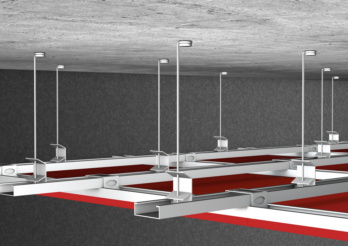 Suspended ceilings
Suspended ceilings
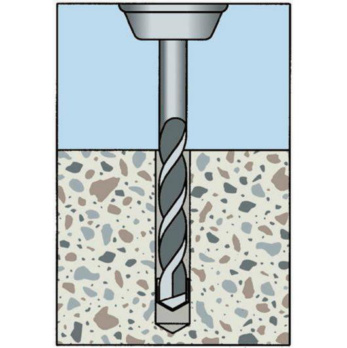 Create the drill hole
Create the drill hole
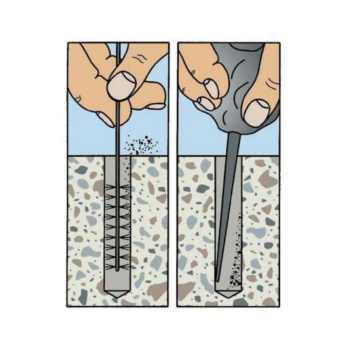 Clean the drill hole
Clean the drill hole
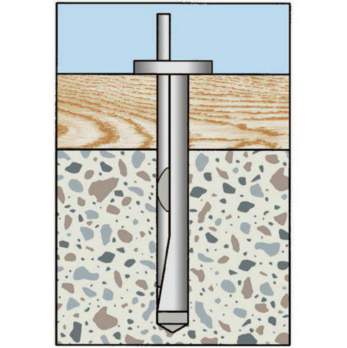 Insert anchor through component
Insert anchor through component
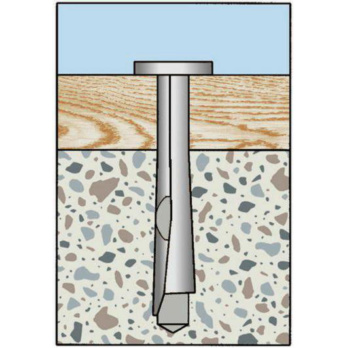 Knock in pin until flush
Knock in pin until flush
Anchors in a non-structural system based on a redundant design in concrete: European Technical Approval ETA-12/0029
- Dimensioned in accordance with the European Technical Approval Guidelines (ETAG) for "Metal Anchors for Use in Concrete", Appendix C, design method C
- Anchorage with European Technical Approval in cracked concrete (concrete tensile zone) and non-cracked concrete (concrete compression zone)
- The anchor has European Technical Approval for use in reinforced or unreinforced normal weight concrete with a strength class of min. C20/25 and max. C50/60 in accordance with EN 206-1:2000-12
Fire resistance: R30, R60, R90, R120 (base material: concrete C20/25 to C50/60): Technical Report TR 020 "Evaluation of anchorages in concrete concerning resistance to fire" (included in ETA-12/0029)
Datasheets(X)
CAD data (available after login)
- Suitable for attaching lightweight ceiling cladding and suspended ceilings, metal profiles, perforated strips, wire hangers, vernier hangers, wooden strips, wooden laths, square timbers, etc.
- May only be used in dry indoor room conditions
Type description | W-DN |
Material | Steel |
Surface | Zinc plated |
Anchor diameter | 6 mm |
Max. attachment height (t fix) | 5 mm |
Effective anchoring depth (h ef) | 32 mm |
Nominal drill-bit diameter (d 0) | 6 mm |
Drill hole depth (h 0) | 40 mm |
Through-hole in the component to be connected (d f) | 7 mm |
Drill cutting diameter (d cut) | 6.4 mm |
Minimum component thickness (h min) | 80 mm |
| Performance data | ||
| Anchor diameter [mm] | 6 | |
| Anchors in a non-structural system based on a redundant design in concrete (for all load directions) | Fzul [kN] ≥ C20/25 und ≤ C50/60 1) | 2.41) |
| Permissible bending moment | Mzul [Nm] | 3,1 |
| Adm. load under exposure to fire (Technical Report TR 020) for spacing and edge distances, see European Technical Assessment ETA-06/0259 | R30; Fzul [kN]2) | 0,8 |
| R60; Fzul [kN]2) | 0,7 | |
| R90; Fzul [kN]2) | 0,6 | |
| R120; Fzul [kN]2) | 0,4 | |
| 1) The partial safety factors of the resistances regulated in the approval and a partial safety factor of the effects of γF = 1.4 have been taken into account. Please refer to the European Technical Approval Guidelines (ETAG), Annex C, for information on combining tensile and shear loads, influence of the edge distance and groups of anchors. 2) The partial safety factors for load capacity under exposure to fire of γM,fi = 1.0 and the partial safety factor of the actions of γF = 1.0 have been taken into account. 3) Tungsten carbide hammer drill bits must comply with the specifications set out in the information leaflet of the Deutsches Institut für Bautechnik (German Institute of Civil Engineering - DIBt) and the Fachverband Werkzeugindustrie e.V. (Association of German Tool Manufacturers - FWI) on the characteristic values, requirements and tests for masonry drill bits with tungsten carbide cutting body which are used for the manufacture of drilled holes for anchoring. Würth hammer drill bits meet the specifications set out in the information leaflet. 4) Number of attachment points ≥ 3 and at least one anchor per attachment point produces a load per attachment point of Fzul ≤ 1.4 kN or number of attachment points ≥ 4 and at least one anchor per attachment point produces a load per attachment point of Fzul ≤ 2.1 kN. The admissible loads can be increased if the design shows that the requirements governing the strength and rigidity of the component to be attached remain satisfied even after the failure of an anchor in terms of the limit state of serviceability and load-bearing capacity. | ||
| Characteristic values | ||
| Axis spacing | scr [mm] | 200 |
| Edge distance | ccr [mm] | 150 |
| Minimum member thickness | hmin [mm] | 80 |
| Effective anchorage depth | hef [mm] | 32 |
| Nominal drill ∅ 3) | d0 [mm] | 6 |
| Cutting edge ∅ 3) | dcut ≤ [mm] | 6,4 |
| Drill hole depth | h0 ≥ [mm] | 40 |
| Through hole in the component being connected | df ≤ [mm] | 7 |
| 3) Tungsten carbide hammer drill bits must comply with the specifications set out in the information leaflet of the Deutsches Institut für Bautechnik (German Institute of Civil Engineering - DIBt) and the Fachverband Werkzeugindustrie e.V. (Association of German Tool Manufacturers - FWI) on the characteristic values, requirements and tests for masonry drill bits with tungsten carbide cutting body which are used for the manufacture of drilled holes for anchoring. Würth hammer drill bits meet the specifications set out in the information leaflet. | ||
Select RAL-colour code
!! NOTE: On-screen visualisation of the colour differs from real colour shade!!

















